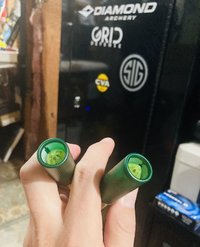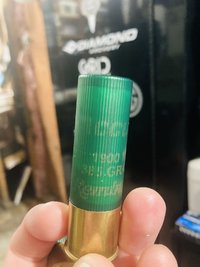allen-1
NES Member
Remington Selling Ammo Business To SC Company -
The Wall Street Journal reported yesterday that Remington Arms has agreed to sell its ammunition business for $65 million…
 onlygunsandmoney.com
onlygunsandmoney.com
If you enjoy the forum please consider supporting it by signing up for a NES Membership The benefits pay for the membership many times over.
Be sure to enter the NES/MFS May Giveaway ***Canik METE SFX***
 onlygunsandmoney.com
onlygunsandmoney.com
Buy it, sell all the primers and bullets in 3hrs, make a profit, sell it again.
Seems like a giveaway to me. Someone can produce enough ammo to recoup their investment in no time the way things are headed. I haven't bought any factory ammo since 2008 so it is just a guess on my part.
-Correction, I bought some Hornady 45/70 in 2009.
The contrary would be more likely. The chaos Dems plan for this election process, which will last for months, will keep demand for ammo sky-high. So will the large number of first-time firearm buyers who want to practice their new sport.Risky time to get into the ammo business with an election right around the corner..i guess they are feeling confident about DJT..
Cerberus. Pulled all the equity out of Remington then loaded them up with debt and dumped them. Also bought Chrysler and raped them too.Not surprised.
What was that investment group that bought Remington and Marlin and a few others all within a short period several years back?
Not surprised.
What was that investment group that bought Remington and Marlin and a few others all within a short period several years back?
Buy it, sell all the primers and bullets in 3hrs, make a profit, sell it again.
![ROFL [rofl] [rofl]](/xen/styles/default/xenforo/smilies.vb/013.gif)
I prefer the mini-dropper bottle.I like their gun oil spray cans, but ...
TBH, I haven't used the spray can.
Remington is up the creek and now they’re selling the paddle.
The heads of Cerberus should be put on a pike.Cerberus. Pulled all the equity out of Remington then loaded them up with debt and dumped them. Also bought Chrysler and raped them too.
'In order to buy Remington, Cerberus, as most private-equity firms would, created a new entity, a holding company. Instead of Cerberus buying a gun company, Cerberus put money into the holding company, and the holding company bought Remington. The entities were related but — and this was crucial — each could borrow money independently. In 2010, Cerberus had the holding company borrow $225 million from an undisclosed group of lenders, most likely hedge funds. Because this loan was risky — the lenders would be paid only if Remington made a lot of money or was sold — the holding company offered a generous interest rate of around 11 percent, much higher than a typical corporate loan. When the interest payments were due, the holding company paid them not in cash but with paid-in-kind notes, that is, with more debt. These are known as PIK notes.
The holding company now had $225 million in borrowed cash. Cerberus, meanwhile, owned most of the shares of the holding company’s stock, basically slips of paper they acquired when they created the holding company. The handoff happened next: The holding company spent most of the $225 million buying back its own stock, effectively transferring all the borrowed cash to Cerberus. Cerberus would keep that money no matter what. Meanwhile Remington continued rolling along as though nothing had happened, because Remington itself was not responsible for the holding company’s debt. Remington was just an “operating company” that the holding company owned, something that allowed the holding company to borrow money, the way you would take a necklace to a pawnshop. These were garden-variety maneuvers in a private-equity buyout. In the trade, this is called “financial engineering.” People get degrees in it.
In April 2012, Cerberus did something fateful, which probably seemed smart at the time. It had Remington borrow hundreds of millions of dollars and use it to buy the holding company’s debt, effectively transferring responsibility for the principal and the interest payments onto Remington. America’s oldest gun company now owed the money that Cerberus had used to pay itself back for having bought the company in the first place. There were plenty of sensible reasons to do this. Gun sales were high, and the debt that Remington took out was cheaper to service than the paid-in-kind debt.
But there was a catch. Because the operating company borrowed the money with a normal loan — and not with PIK notes — interest payments were required in cash. Suddenly Remington was carrying hundreds of millions of dollars in debt that, if it could not be paid, would cause the business to go bankrupt.
By the time the factory opened in Huntsville, the various players stood in vastly different positions. The private-equity firm had made back its initial investment and was playing with house money. Remington owed hundreds of millions that it hadn’t borrowed. And its workers, urgently, had to make a lot of guns.'
The Captain's Journal » How Cerberus Drove Remington Out Of Business
Cerberus. Pulled all the equity out of Remington then loaded them up with debt and dumped them. Also bought Chrysler and raped them too.
'In order to buy Remington, Cerberus, as most private-equity firms would, created a new entity, a holding company. Instead of Cerberus buying a gun company, Cerberus put money into the holding company, and the holding company bought Remington. The entities were related but — and this was crucial — each could borrow money independently. In 2010, Cerberus had the holding company borrow $225 million from an undisclosed group of lenders, most likely hedge funds. Because this loan was risky — the lenders would be paid only if Remington made a lot of money or was sold — the holding company offered a generous interest rate of around 11 percent, much higher than a typical corporate loan. When the interest payments were due, the holding company paid them not in cash but with paid-in-kind notes, that is, with more debt. These are known as PIK notes.
The holding company now had $225 million in borrowed cash. Cerberus, meanwhile, owned most of the shares of the holding company’s stock, basically slips of paper they acquired when they created the holding company. The handoff happened next: The holding company spent most of the $225 million buying back its own stock, effectively transferring all the borrowed cash to Cerberus. Cerberus would keep that money no matter what. Meanwhile Remington continued rolling along as though nothing had happened, because Remington itself was not responsible for the holding company’s debt. Remington was just an “operating company” that the holding company owned, something that allowed the holding company to borrow money, the way you would take a necklace to a pawnshop. These were garden-variety maneuvers in a private-equity buyout. In the trade, this is called “financial engineering.” People get degrees in it.
In April 2012, Cerberus did something fateful, which probably seemed smart at the time. It had Remington borrow hundreds of millions of dollars and use it to buy the holding company’s debt, effectively transferring responsibility for the principal and the interest payments onto Remington. America’s oldest gun company now owed the money that Cerberus had used to pay itself back for having bought the company in the first place. There were plenty of sensible reasons to do this. Gun sales were high, and the debt that Remington took out was cheaper to service than the paid-in-kind debt.
But there was a catch. Because the operating company borrowed the money with a normal loan — and not with PIK notes — interest payments were required in cash. Suddenly Remington was carrying hundreds of millions of dollars in debt that, if it could not be paid, would cause the business to go bankrupt.
By the time the factory opened in Huntsville, the various players stood in vastly different positions. The private-equity firm had made back its initial investment and was playing with house money. Remington owed hundreds of millions that it hadn’t borrowed. And its workers, urgently, had to make a lot of guns.'
The Captain's Journal » How Cerberus Drove Remington Out Of Business

In the medical community we call that the perineal region. We can also call it the grundel. There’s an ammo for that too, 6.5 grundel.There is that yin and yang thing about conglomeration. Actually it's closer to my yingyang. Definitely in the sub-cockel region.
Yup. TS was getting like $125 a case for the STS now?The buyers better not [beep] with Remington’s STS and Gold Nitro shotgun rounds. Not only were they good factory rounds, but the hulls could be reloaded 2x as many times as the Winchester AAs, if not more.
Now I’m kicking myself for not buying an extra couple of cases (250 rounds for shotgun, generally speaking) last summer or the summer before.
Let me not forget those. Super accurate. I was hitting a little 3 inch steel plate consistently at 100 yards with a 3x9 scope. I only have two left from last year’s 2x 5 packs. 1 pack for sighting in. The other pack? 2 for each deer and one miss. 2 left.Their accuTip slugs hit like Thor’s hammer on whitetail and can drive nails out to 75 yards... Same hole groups in my 11-87. They’re awesome.


